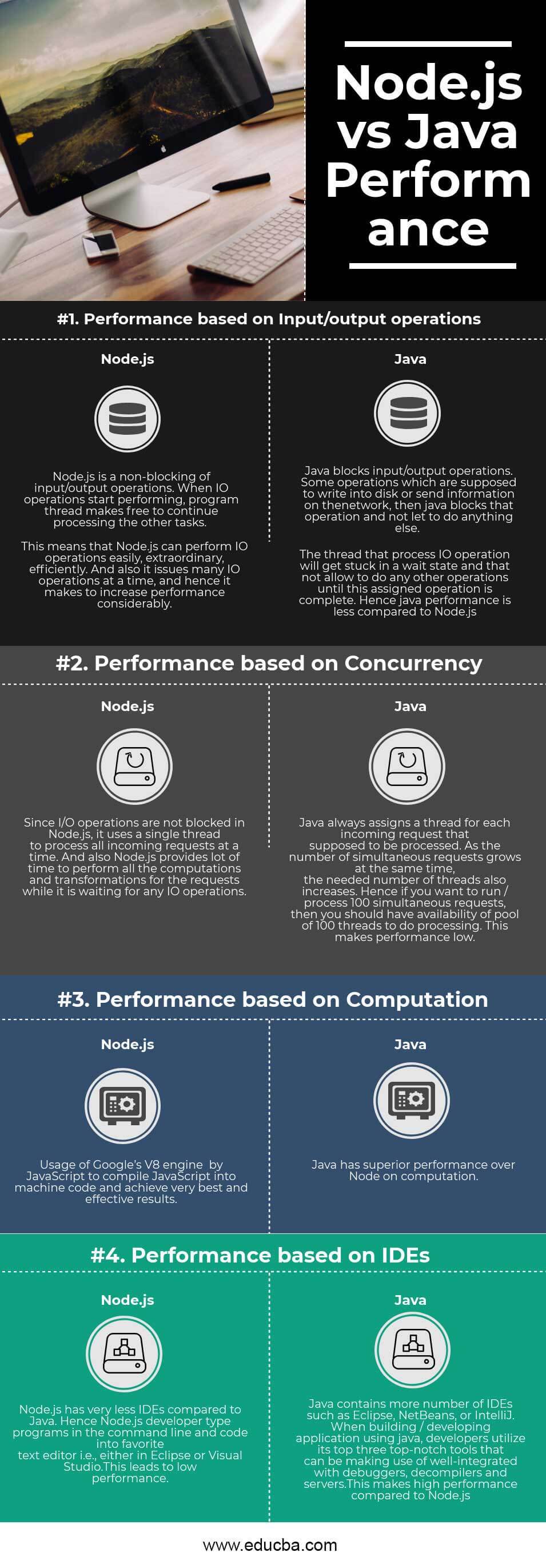Updated March 4, 2023
Difference Between Node.js and Java Performance
Node.js is an open-source and very powerful framework/cross-platform JavaScript run-time environment. Node.js executes the JavaScript code on the server-side. Node.js is mainly used to develop server-side applications and networking applications. Java is a very popular programming language, and also it is a computing platform for developing applications. Java performance is high, and also it is fast, robust, reliable, and secure. Java is famous for its unique feature; that is, it is a platform-independent language.
Node.js
Node.js was built on Google Chrome’s JavaScript engine (i.e., V8 Engine). Before introducing Node.js in the market, JavaScript was used only for client-side scripting where scripting is embedded in a web page’s HTML and made to run on the client-side by a JavaScript engine in the user’s browser itself. The purpose of introducing Node.js is that it allows developers to use JavaScript for server-side scripting and running it on the server-side to produce dynamic web page content before that particular page is sent to the user’s browser. Node.js also provides a huge number of libraries for various JavaScript modules, which helps the developer to develop web applications using Node.js to a great extent. i.e.,
Node.js = Runtime Environment + JavaScript Library
Node.js was developed by a person Ryan Dahl, and it was initially released on May 27, 2009. When Node.js was introduced, it was supported only in Mac OS X and Linux operating systems, but it supported all the operating systems – Linux, macOS, Microsoft Windows, SmartOS, FreeBSD, and IBM AIX.
Below are some of the important features of Node.js:
- Single-Threaded but Highly Scalable
- No Buffering
- License.
- Asynchronous and Event-Driven
- Very Fast
Java Performance
- Java was first released by developed by Sun Microsystems, but later, Sun Microsystems acquired by Oracle Corporation in the year 2009. Nowadays, the Java platform is commonly used as a foundation for application development and also to deliver content on the web.
- Java is famous for its unique feature; that is, it is a platform-independent language (means it is not specific to any of the processors or runs on most of the OS, which includes Mac OS, Windows, and Linux.
- The Java platform is a collection of programs that help in application development and run programs written in the Java programming language. Java platform also includes an execution engine, compiler and a set of libraries.
Head To Head Comparison Between Node.js and Java Performance (Infographics)
Below is the top 4 difference between Node.js vs Java Performance
Key differences between Node.js vs Java Performance
Both Node.js vs Java Performance are popular choices in the market; let us discuss some of the major Difference Between Node.js vs Java Performance:
- Node.js is a non-blocking of input/output operations. This means that Node.js can perform IO operations easily, extraordinarily, efficiently. It also issues many IO operations at a time, and hence it makes to increases performance considerably. Java has blocked input/output operations. The thread that processes the IO operation will get stuck in a wait state, and that not allow doing any other operations until this assigned operation is complete.
- Hence Node.js makes to increases performance considerably when compared to Java performance.
- Node.js has a lot of time to do all the computations and transformations for the requests using a single thread. Whereas Java uses one thread for one request, and hence it takes much time to process the concurrent request.
- Hence the performance of Node.js is high compared to Java performance.
- Variables in Java are statically typed, whereas, in Ruby, variables are dynamically typed.
- Java has superior performance over Node on computation. Whereas JavaScript uses Google’s V8 engine to compile JavaScript into machine code to achieve very good and effective results.
- Node.js developer type programs in the command line and code into the favorite text editor, i.e., either in Eclipse or Visual Studio. Where Java has many IDEs such as Eclipse, NetBeans, or IntelliJ, developers write their code here. Hence it boosts up the performance using Java compared to Node.js.
Node.js vs Java Performance Comparison Table
The primary Comparisons are discussed below:
| The basis of comparison | Node.js | Java |
| Performance-based on Input/output operations |
Node.js is a non-blocking of input/output operations. When IO operations start performing, the program thread makes free to continue processing the other tasks. This means that Node.js can perform IO operations easily, extraordinarily, efficiently. And also, it issues many IO operations at a time, and hence it makes to increases performance considerably. |
Java blocks input/output operations. Some operations are supposed to write into a disk or send information on the network, then java blocks that operation and not let to do anything else. The thread that processes the IO operation will get stuck in a wait state, and that not allow doing any other operations until this assigned operation is complete. Hence java performance is less compared to Node.js |
| Performance-based on Concurrency |
Since I/O operations are not blocked in Node.js, it uses a single thread to process all incoming requests at a time. And also, Node.js provides a lot of time to perform all the computations and transformations for the requests while it is waiting for any IO operations. | Java always assigns a thread for each incoming request that is supposed to be processed. As the number of simultaneous requests grows at the same time, the needed number of threads also increases. Hence if you want to run / process 100 simultaneous requests, then you should have the availability of a pool of 100 threads to do the processing. This makes performance low. |
| Performance-based on Computation |
Usage of Google’s V8 engine by JavaScript to compile JavaScript into machine code and achieve the very best and effective results. | Java has superior performance over Node on computation. |
| Performance-based on IDEs |
Node.js has very fewer IDEs compared to Java. Hence Node.js developers type programs in the command line and code into a favorite text editor, i.e., either in Eclipse or Visual Studio. This leads to low performance. |
Java contains a number of IDEs such as Eclipse, NetBeans, or IntelliJ. When building / developing applications using java, developers utilize its top three top-notch tools that can be making use of well-integrated with debuggers, decompilers, and servers. This makes high performance compared to Node.js |
Conclusion
Calculating the performance for Node.js and Java is very complicated. Both Node.js vs Java Performance possess both advantages and disadvantages for performance on one other with its own and great qualities.
For example, it depends on what kinds of languages are my team comfortable with to achieve the performance, i.e., the team who have knowledge of C++, C# – Java is chosen and also easier to pick up. And the team who have knowledge of Python, Ruby, PHP, and JavaScript – Node will probably be easier.
Hence it is concluded that it completely depends on the requirement to choose. But when it comes to comparison of performance, Node.js stands in first place over Java.
Recommended Article
This has been a guide to the top differences between Node.js vs Java Performance. Here we also discuss the Node.js vs Java Performance key differences with infographics and comparison table. You may also have a look at the following articles to learn more –




